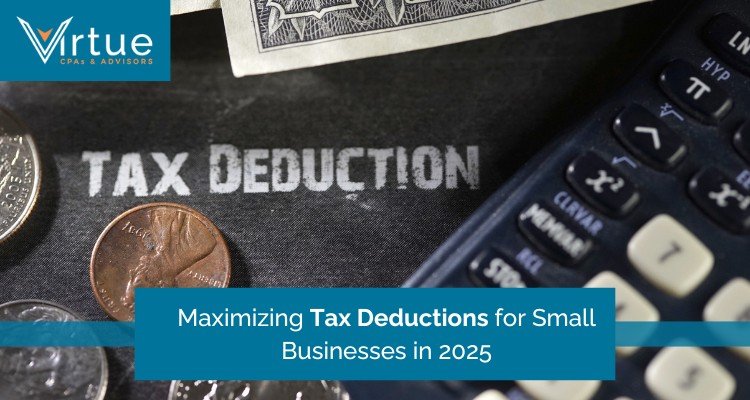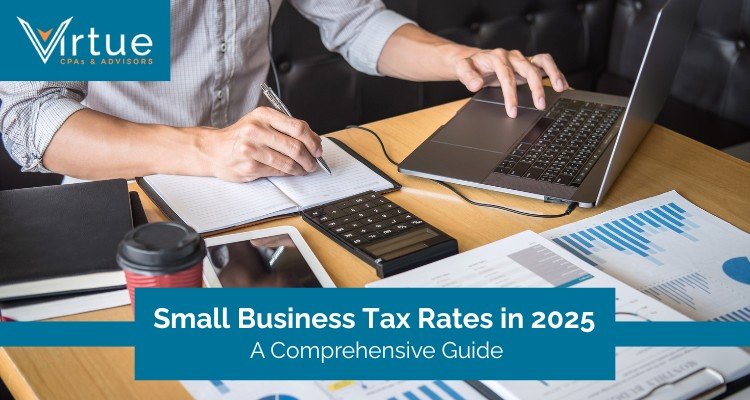What is a Tax Deduction?
A tax deduction or tax write-off is an expense that can be subtracted from your taxable income, helping you lower your tax bill. However, the expense must meet IRS guidelines to qualify.
In this blog, we have provided a detailed list of expenses that self-employed businesses, whether partnerships or sole proprietors, can deduct. These 17 big deductions and write-offs are tax loopholes for small businesses, which can help them to deduct their taxable amount. Some are personal expenses that small business owners should know about, while others are specifically for businesses.
The 17 big tax deductions for small businesses in 2025
Here is the list of the 17 tax loopholes for small businesses that you may deduct when filing your taxes. Review this tax deduction checklist for small businesses and claim your tax deduction:
1. Advertising and Promotion
You can deduct the cost of advertising and promotion.
For instance, hiring a logo designer, printing brochures, buying advertising space, sending cards to clients, creating a website, managing a social media campaign, or supporting an event. But you can't deduct payments for political campaigns, events, or lobbying.
2. Business Meals
In most cases, you can deduct half of your food and drink costs in the business. To qualify for the deduction, you need to make sure that the cost is a necessary part of running your business, the meal is not lavished and either the business owner or an employee must be present.
Thus, you can deduct all expenses for providing meals to employees, such as ordering pizza for dinner during late work hours. Also, meals at picnics and office parties are fully deductible.
Keep records of the outing including date, location, expenses, and business relationship. Note the purpose of the meal and discussion on the back of the receipt. And at the time of tax filing, your business meal will be deductible.
3. Business Insurance
You can deduct the premiums for business insurance. This may cover property insurance, risk inclusion, employee health and dental insurance, workers' compensation, business auto insurance, and more.
If the business or its owner is not named as a beneficiary, employees can be covered by life insurance. Even business interruption protection can be included.
4. Business Interest and Bank Fees
It is the best decision to have separate accounts and credit cards for your business. You can deduct overdraft fees, transfer fees, and service fees from your bank or credit card company.
You can also deduct merchant fees paid to third-party processors like PayPal or Stripe. However, personal account and credit card fees are not deductible.
5. Business Use of Your Car
If you use your vehicle for business purposes only, you can deduct all operating expenses. If you use it for both business and personal trips, you can deduct expenses related to business use. You can deduct vehicle expenses in two ways and choose the one that saves you the most on taxes.
The standard mileage rate is $0.66 per mile in 2025. The actual cost method involves tracking all operating expenses for the year and dividing them by the proportion of business miles driven. You cannot switch between the two methods for the same vehicle.
Keep a detailed log of your business miles, and use an app, or other documents to track your trips. Remember, you can't deduct commuting expenses between your home and regular workplace.
6. Contract Labor
If you pay a freelancer $600 or more in a year, then you can send them a Form 1099-NEC by January 31st of the following year and deduct their fees from your business expenses as contract labor.
7. Depreciation
Depreciation rules require spreading the costs of business assets over the number of years you'll use them, rather than deducting the full cost at once. The quicker tax benefit makes it more appealing to expense these items upfront.
Fortunately, the IRS provides business owners with several options for deducting the entire cost within a single year. Businesses can also deduct up to $1,080,000 in property put into service during the tax year thanks to the Section 179 deduction.
Bonus depreciation allows businesses to deduct 100% of the cost of furniture, computers, machinery, and equipment. If you do not claim bonus depreciation in the first year, you can only deduct $10,100 in depreciation.
8. Education
Education expenses that increase your skills and benefit your company can be fully deducted. The IRS will assess if the expense improves skills needed for your current business to determine eligibility.
Legitimate business education expenses include classes, webinars, professional publications, field-specific books, workshops, and transportation costs to and from classes. But expenses for education that would qualify you for a different job or schooling unrelated to your business are not eligible for deductions.
9. Home Office Expenses
You can deduct some housing costs from your business income if you have a home office. There are two ways to deduct workspace costs.
For a simplified approach, you can deduct $5 per square foot up to 300 square feet (27.87 m²) used for business. For the standard approach, keep track of all actual costs related to upkeep, like rent, utilities, and repairs.
Make sure you meet the requirements for the deduction, including exclusive and regular use. Your home office must be used solely for business purposes. It doesn't have to be a whole room, but it should have clear boundaries.
If the IRS audits you, include photos of your home office with your tax documents. Your home office should be your main place of business. If you use the standard approach, submit Form 8829 with your Schedule C.
10. Interest
If you pay for business expenses with a credit card or a loan and meet certain conditions for deduction, you can subtract the interest you pay to your lender. The obligation must be legitimate, both you and the lender intend to repay the debt, and there must be a genuine debtor-creditor relationship between you.
Keep in mind that if a loan is used for both business and personal purposes, the interest must be split between the personal and business uses.
11. Legal and Professional Fees
Deductible business expenses include fees for lawyers, accountants, bookkeepers, tax preparers, and online bookkeeping services. However, only the portion of the fee that is directly related to the business can be deducted. If the fees also cover personal work, such as making a will, that portion cannot be deducted.
12. Moving Expenses
The Tax Cuts and Jobs Act of 2017 has removed the deduction for moving expenses for nonmilitary people, but companies can still deduct the cost of moving business equipment, supplies, and inventory between business locations. Keep detailed records to support all expenses related to your business relocation.
13. Rent Expense
You can subtract rental payments as a business cost if you rent equipment or a business location. If you work from home, do not subtract the rent you pay on your home as a business cost. That rent can be subtracted from the expenses of running a home office.
14. Salaries and Benefits
If they meet certain conditions, employee wages, benefits, and vacation time can usually be deducted from taxes. The term ‘employee’ doesn't include partners, LLC members, or sole proprietors. The pay is reasonable, customary, and essential. The services were indeed provided.
15. Taxes and Licenses
Various taxes and licenses related to business expenses can be subtracted. This may cover state fees, payroll taxes, property taxes, sales taxes, fuel fees, and business permits.
16. Telephone and Internet Expenses
Phone and internet expenses for your business can be deducted, but only if they are used exclusively for business purposes. For instance, a second landline dedicated to your business is deductible, while the cost of your primary line is not. Remember to keep detailed records in case of an audit to prove the business use of these services.
17. Travel Expenses
To qualify as business travel, a trip must be ordinary, necessary, and away from your tax home. Your tax home is the entire city or region where you conduct business, regardless of where you live. You must also sleep or rest away from your tax home for a period longer than a typical workday.
The IRS allows deductions for business travel expenses such as transportation, parking and toll fees, taxis, meals and lodging, tips, dry cleaning, business calls, and other essential costs. If you use your vehicle, keep a mileage log and record the business purpose, dates, and expenses.
These deductions can be ensured on Time C or Structure 1065's Timetable K-1. But some deductions mentioned here may not be available to you. Consult with Virtue CPAs & Advisors to know about your available tax deduction on your tax return.
Personal tax deductions for business owners
Here are a few other tax deductions that business owners often claim on their returns.
1. Charity Donations
Charitable Donations cannot be deducted as a business expense for sole proprietorships, LLCs, or partnerships. However, the business owner can claim the deduction on their tax return if the donation is made to a qualified organization.
Charitable donations should be reported on Schedule A of IRS Form 1040 as itemized deductions. In 2023 and 2025, cash contributions are limited to 60% of the taxpayer's adjusted gross income. The IRS permits deductions for both cash and non-cash donations according to yearly rules.
2. Child and Dependent Care Expenses
To qualify for the Child and Dependent Care Credit, you must pay for someone to care for a child or dependent while you work. The dependent must be under 13, a spouse, or someone who cannot care for themselves.
The credit can be 20% to 35% of your expenses, depending on your income. You can claim up to $4,000 for one dependent or $8,000 for two or more. Check IRS Publication 503 for more details. Remember to attach Form 2441 to Form 1040 to claim credit.
3. Retirement Contributions
As a business owner, you can use the retirement accounts of your employees as a business expense. However, your deductible amount depends on the type of retirement plan. Check the IRS guidelines to help figuring out your contribution and deduction for a retirement plan.
4. Health Care Expenses
You can deduct additional medical expenses such as office co-pays and prescription costs along with insurance premiums. These costs are usually part of Schedule A's detailed deductions.
If you own a self-employed business, you can also subtract health insurance premiums for yourself, your spouse, and dependents on Schedule 1 attached to Form 1040. However, if you can join a plan through your spouse's employer, the business cannot subtract those premiums.
Conclusion
Utilizing tax deductions is crucial for reducing your tax bill. You can ensure by maintaining accurate records that you retain those deductions in case of an IRS audit.
Choose Virtue CPA to monitor all your business expenses to maximize legitimate deductions. We are one of the best accounting and taxation firms in Atlanta, USA and our team of qualified accountants has years of expertise in providing services of personal tax, business tax, tax compliance, month-end audit, etc.
Contact us today and let us manage your business tax!







